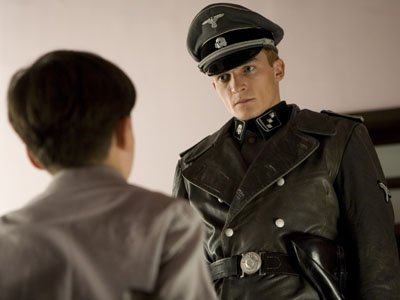Eventually, Bruno's efforts pay off, and he finds a gap in the perimeter. While exploring, he comes upon a barb wire fence, and a scrawny boy playing in the dirt behind it. The skittish kid, who reluctantly introduces himself as Schmuel (Jack Scanlon), just listens to Bruno ramble on until the horn blows and he quickly runs away back to the barracks. As Bruno continues to surreptitiously meet with Schmuel, his family is fracturing. While Elsa seems to be aware of the Final Solution, being so close to it, and sleeping next to a man responsible for it, is wracking her conscience, and she retreats inward, morally on Bruno's side though his play-dates remain a secret. Gretel is taking after her father, absorbing her new tutor's fascist lessons, parroting Nazi propaganda and hate-mongering. The apple of Ralf's eye, she puts away the childish things of her youth and covers her room in Hitler posters and iconography.
I don't necessarily think that the gradual moral awakening of the son of an SS officer is an impossible premise, but The Boy in the Striped Pyjamas cuts a lot of accuracy corners. Verisimilitude is owed to this time period, and I had too many doubts about the mechanics to ever give myself over to the plot. For instance, would Schmuel really be able to sneak away for a few hours to an open part of the camp? Would a child who spent any time in a death camp be able to retain any innocence, at all, as Schmuel does? Wouldn't the child of an SS officer have certain things drilled into him from a very early age? Would the wife of said officer cut him off when he's about to say that Jews aren't really people? Would that wife be so disgusted when her daughter becomes more evangelical about Nazism? Herman doesn't get the usual allowances given to historical films, because this is about something so singularly important. The softening of certain characters and the implausible positions they find themselves in feels disrespectful.
What saves The Boy in the Striped Pyjamas from disaster is the well-observed behavior of Bruno and the performances. Give Herman, who hasn't worked since this film's release, a coming-of-age story and I believe he'd knock that out of the park. The opening revelry is impressive in its naturalism and in the discordant note it hits, as merry children dance past swastikas. Bruno's irrepressibility is combined with a free-range kid's natural curiosity, both ably communicated by Butterfield in a solid child performance. Little touches, like Bruno being unable to hold two schemes in his head at the same time, keep the viewer entertained, if not invested. Both parents are well portrayed by Thewlis and Farmiga, with the reliable Farmiga especially strong in her growing concern. They share a wordless scene in a cemetery that doesn't make sense for their relationship, but is still a powerful representation of the private warring with the public. That it's all in service to this particular film and its misguided purpose is a shame.
The Boy in the Striped Pyjamas just doesn't work. It skirts the inherent cruelty of the setting until the last, possible, most manipulative moment, a moment so over-the-top, it may as well be parody. Herman takes a big swing in trying to make this movie, from this perspective, but there are too many punches pulled and not enough sociological realism. The film posits something like childlike innocence as a corrective to brutality and injustice, opening as it does with a quote about youth as a sensual wonderland until the dark hour of reason. It's sticks in my craw that anyone would try and apply that flawed sentiment to the Holocaust. If that's your theme, maybe apply it to the side of right, or make a better, more grey film about the side of evil. I'm just not interested in watching the son of an SS officer frolic through the woods, especially when the story has as little to offer as this one does. C-

 RSS Feed
RSS Feed